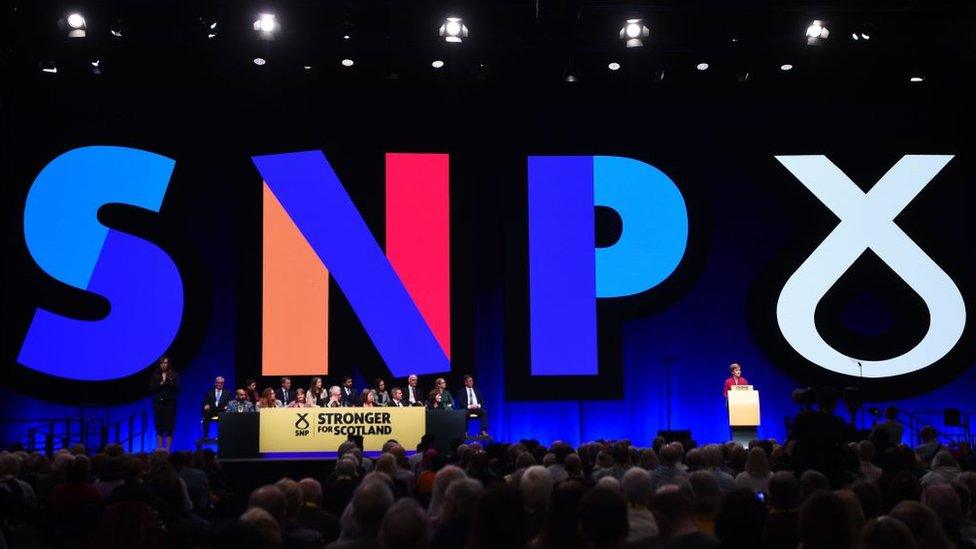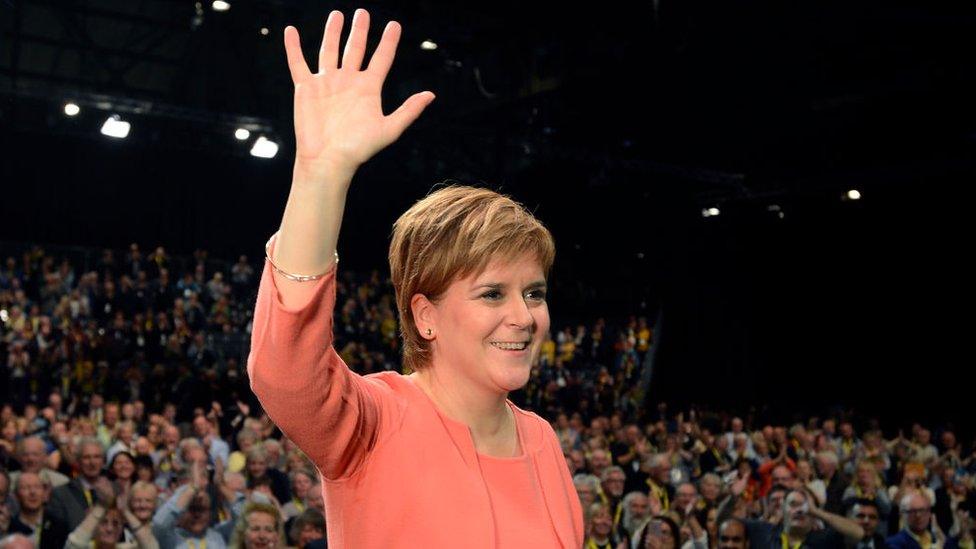SNP opens four-day virtual party conference
- Published

The online conference will look different to the mass events the party has held in the past
The SNP has opened its annual party conference, with the four-day event being conducted entirely online.
It will hear speeches from Deputy First Minister John Swinney and Westminster leader Ian Blackford over the weekend, and Nicola Sturgeon on Monday.
There will also be debates on women's safety, children's rights, post offices and climate change.
Deputy leader Keith Brown said the party was gathering "in great shape, but also with great resolve".
And he predicted that in the months to come, SNP members would make "the case which will lead us to independence".
Speaking as he welcomed delegates to the conference on Friday afternoon, Mr Brown said independence could be won with a message of "optimism and ambition".
He added: "To match our world-leading ambitions to combat global climate change we need a just transition to a cleaner environment.
"We need independence to invest in our bountiful renewable energy resources, which are the envy of Europe.
"The future of our planet depends on it - and it's too important to be left to the Tories."
Mr Brown said the campaign for another referendum was "well under way" despite the Covid pandemic, which opponents have said should be the sole focus of the Scottish government.
He said: "The Scottish government is resuming its crucial work on an updated and detailed prospectus for independence.
"That new government work will be essential to help voters make their fully informed choice and we await the delivery of that new prospectus with eager anticipation.
"Meanwhile, our combined task is clear. We must bring to life our vision of a better, fairer, more sustainable Scotland."

Nicola Sturgeon will address the conference on Monday
The SNP has started a new term in office at Holyrood in a partnership government with the Scottish Greens, having fallen one seat short of an overall majority in May's elections.
The conference comes after the COP26 climate summit was hosted in Glasgow, with Ms Sturgeon saying the party was gathering "at what I hope is a turning point for the world".
She said that the nations of the world need to go further to fight climate change, and that "independent or not, the SNP will always strive to ensure that Scotland plays our part in this global challenge".
The first minister has denied that her climate policies would put oil and gas jobs on the scrap heap after her predecessor, Alex Salmond, accused of her taking a "major backward step" by opposing the proposed Cambo oil field to the west of Shetland.
She predicted a second oil boom for Shetland in 2014 and until recently backed extracting maximum economic value from the North Sea, but told BBC Scotland that climate science had persuaded her to rethink those positions.
In an interview with BBC Scotland political editor Glenn Campbell, she said she still wanted the UK government to subject the Cambo development to new climate tests and that she could not "completely pre-judge" the outcome.
She has previously said that the presumption would be that it couldn't and shouldn't pass those tests.
Climate assessments
The first minister has also appeared to shift position on dualling the A9 from Perth to Inverness.
The Scottish government has made clear this week that it "remains committed" to this project and Ms Sturgeon said that had not changed.
However, she also said that having "committed to early parts" of the scheme, the government would "do climate assessments as we go further down that road"
On independence, she promised to set out the case for a "yes" vote over the next year but would not say when a referendum bill would be introduced to Parliament.
She also declined to say if she would fight the next Holyrood election, although she has said she will serve a full term as first minister.
The conference will debate motions calling for a draft bill to be drawn up for the establishment of a Scottish central bank post-independence, and for early consideration to be given to the design of an independent civil service.
There will also be debates about maintaining Scotland's links with the European Parliament, access to sign language in education and support for regional vaccine manufacturing hubs.
The first day of the conference saw delegates back calls for the Scottish government to roll out a scheme aimed at helping those who have suffered violence or abuse because of their gender.
They passed a motion calling for the Emily Test pink card scheme, set up by the mother of a student who took her own life after experiencing domestic abuse, to be further expanded.
The scheme, named after 18-year-old Emily Drouet, has already seen more than 100,000 cards distributed to staff at universities and colleges, detailing where support is available if someone speaks out about abuse.
The motion, passed overwhelmingly by activists, called for this to be expanded across the emergency services and to all staff working in education.